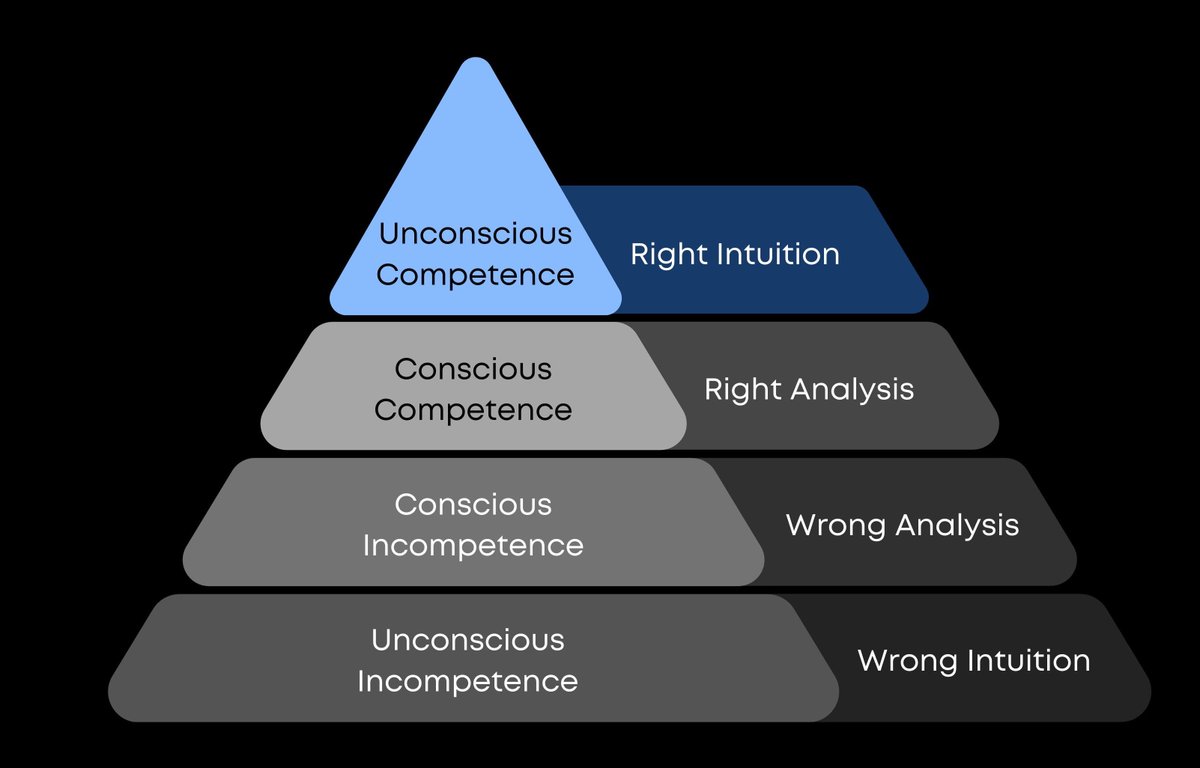The 4 Stages of Competence
The 4 Stages of Competence framework was created by Matthew Broadwell in 1969 and states that we progress through stages when moving from total novice to expert at a given craft.

Sahil Bloom
Exploring my curiosity and sharing what I learn along the way. Gave up a grand slam on ESPN in 2012 and still waiting for it to land.

-
If you want to become an expert at anything, read this.
— Sahil Bloom (@SahilBloom) April 19, 2023
The 4 Stages of Competence: pic.twitter.com/0sYP7XdUOZ -
The “4 Stages of Competence" framework was created by Matthew Broadwell in 1969.
— Sahil Bloom (@SahilBloom) April 19, 2023
It says we progress through stages when moving from total novice to expert at a given craft.
The stages are as follows: -
Stage 1: Unconscious Incompetence.
— Sahil Bloom (@SahilBloom) April 19, 2023
At this stage, you're a total novice and don't even know what you don't know.
You lack competence and don't have an understanding of your own incompetence. -
Stage 2: Conscious Incompetence.
— Sahil Bloom (@SahilBloom) April 19, 2023
Here, you've become aware of your own incompetence, but you haven't addressed it yet.
You know that there's a gap in your skills that needs to be filled. -
Stage 3: Conscious Competence.
— Sahil Bloom (@SahilBloom) April 19, 2023
At this stage, you've developed a level of competence at your craft, but it requires conscious effort and focus.
You can do it, but it takes work. -
Stage 4: Unconscious Competence.
— Sahil Bloom (@SahilBloom) April 19, 2023
This is the pinnacle of expertise, where you have extreme competence and can execute without conscious effort.
Few people ever reach this stage. -
I visualize it most clearly as a hierarchy, with progress marked by a graduation up the pyramid from one stage to the next.
— Sahil Bloom (@SahilBloom) April 19, 2023
This model is useful as a reflection tool for providing clarity about where we sit on a given skill or craft at any given moment. pic.twitter.com/5KpK93rHAP -
We tend to overestimate our own competency levels, so having a clear framework is helpful for cutting through the noise and delivering an honest personal assessment.
— Sahil Bloom (@SahilBloom) April 19, 2023
To determine whether you've graduated from one stage to the next, here are some simple questions to ask: -
Stage 1 to Stage 2:
— Sahil Bloom (@SahilBloom) April 19, 2023
• Am I aware of how bad I am at [X]?
• Am I aware of what is required to learn and develop at [X]?
Stage 2 to Stage 3:
• Can I do [X] at a consistently average level?
• Have I avoided "rookie mistakes" the last 10 times I have done [X]? -
Stage 3 to Stage 4:
— Sahil Bloom (@SahilBloom) April 19, 2023
• Can I do [X] at a top-1% level with my eyes closed?
• Do people tell me that I look effortless when doing [X]? -
Most of us will spend our lives in Stage 3, where we can create results with effort.
— Sahil Bloom (@SahilBloom) April 19, 2023
But to reach Stage 4, we need to engage in deep, deliberate, focused practice.
Our brains have myelin, a fatty tissue that insulates our neurons and greases them for proper firing. -
Stage 4 is where countless hours of effortful practice result in more myelin, allowing us to execute with ease.
— Sahil Bloom (@SahilBloom) April 19, 2023
Stage 4 is the level of Sprezzatura—studied nonchalance, earned effortlessness. -
It's a state we can aspire to, but few will achieve across more than 1-2 areas in our lives (at best).
— Sahil Bloom (@SahilBloom) April 19, 2023
As you progress in any new endeavor or craft, use the Hierarchy of Competence to reflect on your growth. -
Seek to play games that place a focus on your Stage 3 or 4 skills, and avoid games that place a focus on your Stage 1 or 2 skills.
— Sahil Bloom (@SahilBloom) April 19, 2023
Do that and you'll earn attractive long-term rewards.
Follow me @SahilBloom for more and RT the first tweet to share with others! https://t.co/cINNSOAmku -
Special thanks to @SachinRamje for the beautiful visualization.
— Sahil Bloom (@SahilBloom) April 19, 2023
He does terrific work (and is a wonderful guy). We had been working together online for a while and then finally got to meet for a coffee in Mumbai recently! pic.twitter.com/zvS60ZWZAq -
I’m pretty sure this video of Roger Federer sits next to the definition of “sprezzatura” in the dictionary.
— Sahil Bloom (@SahilBloom) April 19, 2023
This is Stage 4 Competence at its best. pic.twitter.com/uz83wuAJV9 -
Bruce Lee was an example of Stage 4 Competence.
— Sahil Bloom (@SahilBloom) April 19, 2023
The highest state is attained when there is no interference from the mind to make something appear effortful.
The maximum—with the minimum. pic.twitter.com/9D633ZJwRt -
Stage 4 Competence is where we observe the Paradox of Effort:
— Sahil Bloom (@SahilBloom) April 19, 2023
You have to put in more effort to make something appear effortless.
Effortless, elegant performances are often just the result of a large volume of effortful, gritty practice.
Simple is not simple.
